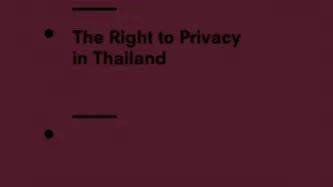Search
Content type: News & Analysis
… order may be just as big a threat to worldwide security and privacy as the old one. The status of the original order … The resulting vulnerability can be exploited by hostile states, criminals and other bad actors the world over. The … in a world where security risks are mounting every day. Privacy International and Liberty's legal challenge to the …
Content type: Long Read
… and intrusive surveillance powers to undermine the privacy and security of people all over the world. Here, we … to users everywhere else in the world. Apple had previously stated that they would sooner withdraw services from the UK … or existence without the permission of the Secretary of State. This can lead to a situation where the privacy and …
Content type: Explainer
… especially when it comes from a company that claims privacy to be one of its core values. Though now we think … due to encryption. In addition, the Secretary of State (‘SoS’) has been granted the further authority to … What PI is calling for Companies and industries protect privacy by design, not exploit people and their data. PI …
Content type: Advocacy
… of a UN treaty against cybercrime are coming to a close, Privacy International is concerned that, in its current, … years of negotiations which exposed deep divisions among states. Key points As Privacy International has consistently … Advocacy Post date 7th August 2024 Attachments PI written statement on UN cybertreaty 7August2024_0.pdf Learn more …
Content type: Advocacy
… In this briefing, Privacy International outlines its analysis of some key … Throughout the negotiations most of proposals by Member States and other stakeholders aimed at restricting the scope … updated draft remains too broad in scope and would allow States to adopt measures that would undermine human rights …
Content type: Advocacy
… that are respectful of human rights, including the right to privacy, instead of surveillance-based technological … to lead to overly broad collection of personal data by the State party.” Regarding the Data Protection Bill, the … peaceful gatherings.” Advocacy Post date 27th February 2024 Privacy International had suggested the Human Rights …
Content type: Advocacy
… be used to prevent companies from implementing important privacy and security measures. PI is joining other UK civil … subsequent litigation have repeatedly identified unlawful state surveillance by UK agencies. In response, the UK … private companies into arms of the UK surveillance state. We are concerned that many of these powers may be …
Content type: Long Read
… for users all around the world. Why this is important While privacy and security is often portrayed as opposite to each … to access your data and not only the company. For instance, state authorities with a warrant could potentially force … accessed by Apple, as a result, also governments and other state authorities cannot request to access them (not even …
Content type: Report
… encryption (E2EE) contributes significantly to security and privacy. For that reason, PI has long been in favour of the … to recreate, in the digital world, the guarantees of privacy that have traditionally applied in private … but rarely secures the metadata of communications. Some states also place restrictions, including criminal …
Content type: Examples
… and computer science professor and his team from The Ohio State University discovered a design flaw in low-powered … and computer science professor and his team from The Ohio State University discovered a design flaw in low-powered … and/or vendors must be responsible for the security and privacy design in the products they manufacture and sell, …
Content type: News & Analysis
… News & Analysis Post date 29th May 2019 Privacy International has joined a global coalition of … that “104 officers in 18 different agencies across the state had accessed her driver’s license record 425 times, using the state database as their personal Facebook service.”13 Thus, …
Content type: Advocacy
… Advocacy Post date 3rd April 2017 Privacy International's submission on the right to privacy in Thailand, Human Rights Committee, 119th Session. … inadequate, unclear as to the powers, scope and capacity of state surveillance activities and thus it falls short of the …










